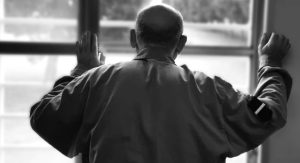This article precedes a research paper that will be published in 2024. For further information on Children that accompany a parent Prison, or the health of older people in prison, contact the author using the details at the end of this article The prison system, while serving a vital role in society by ensuring public safety and holding individuals accountable for their actions, often comes at a cost to those directly and indirectly affected by it. Two distinct sub-groups within the prison population – children who accompany their parents in prison and older inmates – are routinely denied access to basic human rights, particularly in the areas of early years education and healthcare. This article delves into these injustices, highlighting the need for urgent action and systemic reform
By Philip J Gover BA MA MPH
Public Health Consultant, Cooperation Works
Who Suffers Most: The Visibility of Children and Older People in Prison
Children in Prison: Denied a Fundamental Right
Children who accompany a parent (routinely the mother) in prison are essentially the innocent victims of circumstance, yet they face a multitude of challenges that can have lasting consequences on their personal development. One of the most significant is the lack of access to early years education. These crucial years, from birth to age five, are critical for building a strong foundation in cognitive, social, and emotional development. Yet, children in prison settings are often excluded from early childhood education programs, depriving them of the opportunity to learn, play, and interact with their peers in a stimulating environment. For those invisible children who live their life on the inside, the formative years of development are being wasted.
The Consequences of Educational Deprivation
The lack of early years education can have severe consequences for children in prison. Studies have shown that children who are deprived of educational opportunities are more likely to experience developmental delays, behavioural problems, and academic difficulties later in life. They may also struggle to build healthy relationships and integrate into society upon release. This can create a cycle of disadvantage, perpetuating the same issues that led to their parents’ incarceration.
Investing in early years education for children in prison is not just a moral obligation; it’s an economic imperative. By providing these children with the support and resources they need to thrive, we can help break some of the elements that contribute to the cycle of poverty and crime, and promote safer and more prosperous futures for more.
Addressing the Healthcare Needs of Older Prisoners
As the global prison population ages, the number of older inmates is also on the rise. This demographic faces unique challenges, including increased vulnerability to poor health, mobility issues, and chronic diseases. In overcrowded prisons, the consequences are multiplied. Yet, healthcare services within prison settings are often inadequate, lacking the resources and expertise to meet the specific needs of older inmates. In other corners of the world, these services are absent. This lack of appropriate care can result in needless suffering and long term increases in healthcare costs for society as a whole. At worst, the consequences can lead to preventable premature death. Like metrics associated with excess Winter deaths and heat implicated mortality, we need to pay more attention to premature and preventable prison-based mortality.
The Human Rights Dimension
Both the denial of early years education for children in prison and the neglect of healthcare for older inmates raise serious human rights concerns. These individuals are entitled to the same basic rights as everyone else, including access to education and healthcare. Yet, the prison system often fails to uphold these rights, creating a system of inequality and injustice.
The Need for Systemic Change
To ensure that all individuals within the prison system have access to their fundamental rights, systemic change is needed. This includes:
- Investing in early years education programs for children in prison. This would involve providing early years learning systems, qualified educators, age-appropriate materials, and safe creative space in which to learn.
- Improving healthcare services for all prison populations is essential, but for older prisoners, it is critical. This would require increasing funding, recruiting and training specialized healthcare professionals, and implementing age-appropriate care plans.
- Ratifying and implementing international human rights treaties that guarantee the rights of prisoners. This would provide a legal framework for ensuring that all prisoners are treated with dignity and respect.
- Promoting public awareness and understanding of the unique challenges faced by children in prison and older inmates. This would help generate support for reform efforts and create a more compassionate and humane prison system.
Conclusion
The denial of early years education for children in prison and the neglect of healthcare among older inmates are unacceptable injustices that demand immediate attention. By advocating for systemic change, investing in essential programs and upholding human rights principles, we can create a prison system that is more just, equitable, and humane for all. The well-being of these vulnerable populations is not just a moral imperative, but a crucial step towards building a more inclusive and sustainable future for all.
At Cooperation Works, we see transformational opportunities for those that direct prison systems to play a more proactive role. Prisons can become beacons of education, health, wellbeing and rehabilitation if the political will is present. If we want public health to gain more traction in society and deliver the widespread benefits that we know it can, it is likely to be within a settings approach that can provide the most utility and value.
Public health is a shared responsibility with the determinants of inequality to be found in every corner of society. Prisons are both homes, workplaces and learning environments, but inadequate attention is being given to prison-based education and healthcare. If equality have any place in the future of our society, we could do no worse than prioritising and focusing our efforts on health and educational improvements in prison settings.
About
This article precedes a research paper that will be published in 2024. For further information on Children that accompany a parent Prison, or the health of older people in prison, contact the author using the details below.
Philip J Gover is a Community & Public Health Consultant, based in SE Asia. A frequent speaker at subject specific conferences, his expertise lies in leveraging creativity, innovation and incentives to build transformational systems that reduce poverty and inequality. With an approach rooted in community development and underpinned by the lived experience of members, Philip embraces and promotes adult education, lifelong learning and shared knowledge. For collaborative conversations, contact philip.gover@cooperation.works

